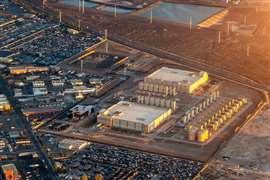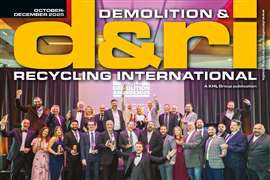Liebherr-Werk Biberach invests for green future
19 July 2010

The Liebherr factory at Biberach an der Riss in Germany, which occupies more than 215,000 m², is where tower cranes, drive and control components are manufactured. It employs 2,300 people.
In 2010 the company is investing a six-figure Euro sum in the site as part of its drive to protect the environment and climate. It is being spent on materials recycling, efficient use of energy and water, sustainable use of raw materials, and renewable energy sources.
Perhaps the most impressive of these features is the acres of solar panels covering the roof of the site's largest production hall. The photovoltaic power plant covers about 30,000 m², with a rated output of some 3 Megawatts. The renewable energy system has an annual capacity to generate nearly 2.6 million kWh of electricity, enough to supply about 600 average households. The installation reduces carbon dioxide emissions by about 2,500 tonnes a year.
Collections
In addition to energy generation, recycling is a major feature at the plant in a drive to minimise waste. In all three working areas of the Biberach plant material collection containers are placed at easily accessible locations. They are identified using a colour-coding system and have their contents clearly indicated. All items are recycled or carefully disposed of as waste. Old cardboard cartons are shredded and used as packing material, while paper, glass, plastic and more, is recycled.
In the production sector, all the processing machines are set up on double-sealed foundations to avoid ground water contamination. The foundations for new machines are specially coated, and the excavation trenches are lined with sheet metal.
The cooling lubricants used on the machining centres are largely reused. Lubricant is collected centrally and conveyed to a distillation system for cleaning and separation. Water is extracted from the dirty lubricant, then the oil is removed, and the water reintroduced into the cooling water cycle. To reduce water consumption further, the coolant lubricants are checked daily and only changed when necessary.
Advanced systems
Air suction systems with a filter arrangement are positioned at the processing machines. The purified hot waste air can be used for heating the production halls. It helps protect the environment and saves money by reducing heating costs.
Noise-reducing cladding is attached to the processing machines and the painting systems predominantly use water-soluble paints. In addition, the vacuum extraction systems are fitted with a filter system to take advantage of the purified hot air.
Renewable sources of energy are not only put to good use at Liebherr; the company also makes an active contribution to their creation with its own products. For around 10 years the Biberach facility has also been developing and producing components for wind power systems. The volume of business in this segment has grown to account for a third of the total turnover in the drive and control components section of Liebherr-Werk Biberach.




